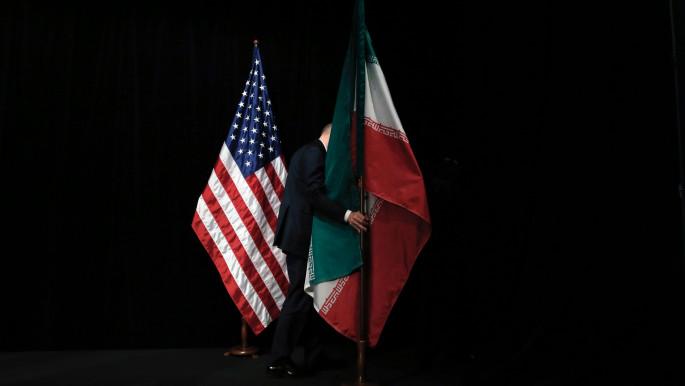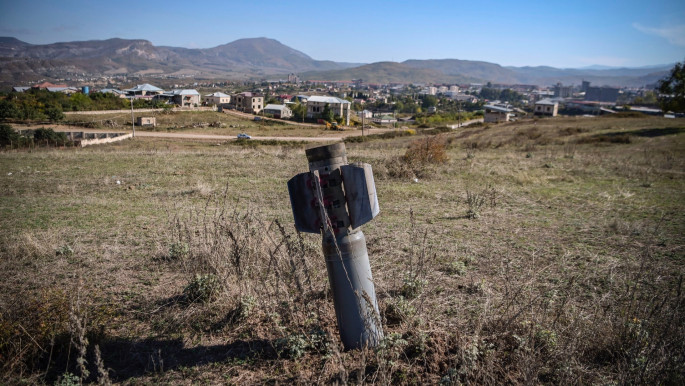Fakhrizadeh's assassination: A new diplomatic obstacle for Biden's Iran policy
The killing was decried as an act of "state terror" carried out by the Islamic Republic's enemies, according to Foreign Minister Mohammad Javad Zarif. The tactics strongly suggest that it was an operation by Israel's Mossad's intelligence agency.
Fakhrizadeh's assassination was instructive of the weaknesses in Iran's security apparatus. In light of the United Arab Emirates-Israel normalisation agreement and Tel Aviv's role in the 2020 conflict in and near Nagorno-Karabakh, Tehran is increasingly worried about the Israelis establishing larger footprints and greater influence in countries neighboring Iran, while further capitalising on Iran's vulnerabilities through their partnerships with Abu Dhabi and Baku.
The operation which killed Fakhrizadeh has also left Iran humiliated. His assassination reminded many Iranians of the Israeli campaign a decade ago which resulted in the killing of four Iranian nuclear scientists. These are old wounds. The fact that Fakhrizadeh's assassination followed general Qasem Soleimani's killing by less than 11 months only adds to the pain from Iran's perspective.
The world is waiting to see how Iran responds. From Syria to Yemen, Iraq to Afghanistan, and Southeast Asia to Latin America, there are many theaters where Tehran could enact revenge with plausible deniability.
 |
The purpose of assassinating Fakhrizadeh was to further escalate hostilities and create a barrier to diplomacy under a new Biden administration |  |
Also further complicating the equation is the fact that some "proxies" of Iran may choose to respond on their own volition without any orders from Tehran. Regardless of how, when, and where Iran retaliates, it is safe to conclude that this assassination will make it harder for President-elect Joe Biden to bring Washington and Tehran to a new understanding.
By greenlighting, or at least not condemning, the suspected Israeli operation, the Trump administration has made its support for the assassination clear. This is part of the outgoing administration's scorched earth approach to US-Iran relations. Put simply, Trump wants to kill the potential for his successor to achieve any diplomatic breakthrough with Tehran that could significantly lower the temperature in US-Iran relations.
 |
|
| Read more: Could Biden bring the US back into the Iran nuclear deal? |
Supported by Prime Minister Benjamin Netanyahu's Israeli government, the Trump administration's agenda, if successful, will prevent Biden from being able to salvage the Joint Comprehensive Plan of Action (JCPOA).
"The purpose [of assassinating Fakhrizadeh] was to further escalate hostilities and create a barrier to diplomacy under a new Biden administration," Dr. Assal Rad, a senior research fellow at the National Iranian American Council, told The New Arab.
Trump pulled the US out of the accord largely to spite Barack Obama's legacy in the Middle East, which was very much tied to his administration's work in negotiating the JCPOA. Biden is a veteran of Obama's White House and is bringing in others from that administration, so it is likely that the 46th president and those in his inner circle will commit to working on saving the nuclear accord.
But what will Iran see as acceptable terms for a freeze in its nuclear activities? Trump's policies vis-à-vis Iran will likely leave Tehran embracing tougher stances on its terms for dealing with Washington. The question of how much "compensation" the Iranians will demand from the US for Washington's 2018 withdrawal from the JCPOA could be difficult for both the US and Iran to agree on.
The Trump administration's 'maximum pressure' has added momentum to the arguments made by those in Iran who don't believe returning to the JCPOA is worth it for their country and who do not desire any rapprochement with Washington.
 |
The path to diplomacy is still open and the JCPOA framework is still intact, it is a choice that will be made by Iran and the new Biden administration whether or not to return to the deal |  |
There is good reason to assume that Iran's next president, who will be elected next year, will be less open to negotiating with the West than Hassan Rouhani. This means that Biden will have a limited amount of time to try to strike some compromise with Iran's current president.
Without doubt, Biden will face challenges and complications as he seeks to save the JCPOA. Yet these will not necessarily become insurmountable roadblocks to a US return to the accord. Even after Fakhrizadeh's assassination, "the path to diplomacy is still open and the JCPOA framework is still intact, it is a choice that will be made by Iran and the new Biden administration whether or not to return to the deal," Dr. Rad says.
 |
|
| Read more: What a Biden presidency means for US ties with Israel |
"Since the Trump administration abrogated the deal, they have continued attempts to pressure and provoke Iran, yet Iran has continued to show shrewd politics and patience. If the Biden administration acts urgently and sets returning to the deal as a top priority, as it should, then Iran will likely return to compliance as it was doing even a year after the US quit the deal."
Iran's dilemma
Officials in Tehran are in no easy position regarding the question of how to respond to Fakhrizadeh's assassination. On one hand, Iran cannot afford to let its adversaries believe such assassinations on Iranian soil can occur in the future without severe consequences. The country's leaders are nervous about what messages the US and Israel would take away from a weak response, let alone none at all.
 |
The outgoing administration has plenty of time to create more fires in the Middle East that will make US diplomacy in the post-Trump era increasingly difficult |
 |
By the same token, Iran's economy desperately needs sanctions relief. With Biden entering the Oval Office on 20 January, Tehran is hopeful that the 46th US president will demonstrate goodwill to Iran with a lifting of some sanctions. Thus, Iran is trying to avoid actions in the region that could make it harder for Biden's administration to embrace a more diplomatic approach to the Islamic Republic.
"Just days before the recent assassination, it was reported that Iranian officials had cautioned allies against any provocation in Trump's final days," explained Dr. Rad. "That in and of itself indicates they are cognizant of this final push towards sabotage and conflict."
 |
|
| Read more: Iran's dilemma in Nagorno-Karabakh |
Yet there is no denying that by appearing to condone the murder of one of Iran's civil servants on Iranian soil, the US is creating conditions that will not be conducive to talks between Washington and Tehran. Biden and those who will serve in his administration will hope that Iran shows restraint in the upcoming days and weeks.
The hard truth is that between now and 20 January, the outgoing administration has plenty of time to create more fires in the tumultuous Middle East that will make US diplomacy in the post-Trump era increasingly difficult.
There is every reason to expect Trump to continue spending the remainder of his one term making aggressive moves against the Islamic Republic that wreak havoc on Biden and Vice President-elect Kamala Harris's goal to bring diplomacy back to US-Iran relations.
Giorgio Cafiero is the CEO of Gulf State Analytics, a Washington, DC-based geopolitical risk consultancy.
Follow him on Twitter: @GiorgioCafiero




 Follow the Middle East's top stories in English at The New Arab on Google News
Follow the Middle East's top stories in English at The New Arab on Google News


